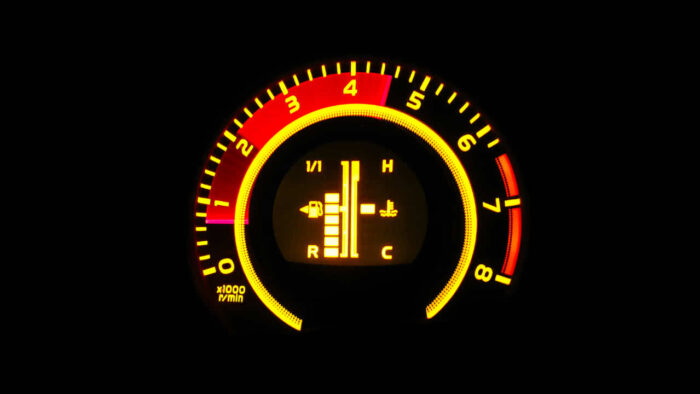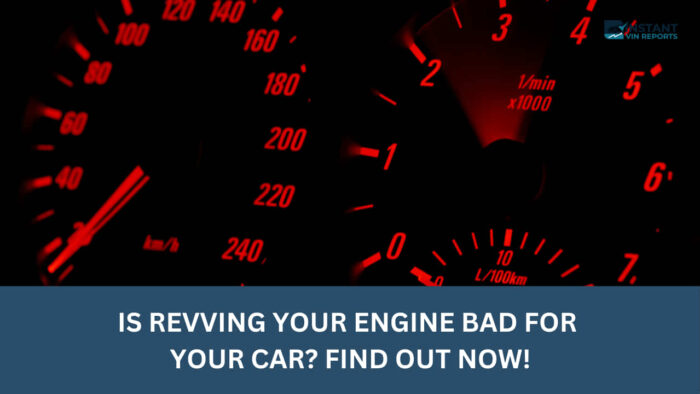Revving an Engine: Can revving an engine hurt the car?
Now, what exactly does it mean to rev an engine? Revving an engine is simply pushing the “pedal to the metal” when the car is in park or neutral. You are well aware that the vehicle is neither going to move forward nor backward, but you are still pushing the accelerator. One major characteristic that is always noticeable when a vehicle is revved is a loud sound. That sound is an indication that the RPM of the vehicle has almost instantly increased and the higher you rev and closer to the red line you get the louder the vehicle becomes.
The process of increasing a vehicle’s RPM (revolutions per minute) while the vehicle is stationary is not really of greatest interest to your vehicle as it comes with great effects to your vehicle’s engine. So, is revving your engine bad for your car? We will discuss the effects of revving an engine in the next section.

What happens when you rev an engine?
When you rev an engine, the vehicle is usually not in motion, and this causes a great deal of trouble to some of the vehicle parts. Some of the effects of revving an engine are:
Increased wear on engine components
When a driver revs an engine, there is a big chance that there will be increased wear and tear on the components of the engine. Some of these components include the pistons, connecting rods, crankshaft, and others.
Revving, most especially when done abruptly, may cause increased wear because, assuming the vehicle is not even warm yet, the engine revs way above the vehicle’s maximum speed. One thing that happens here is that the engine heats up too quickly, and the oil may not be able to reach its optimal operating temperature before the pressure from the accelerator is applied. So, if you are thinking of revving that engine, ensure that the vehicle is warmed up at least.
ALSO READ: The most affordable and budget-friendly fuel-efficient cars of 2023
Increased fuel consumption
As a rule of thumb, the lower you keep your RPM, the less fuel it is going to consume. This means regularly revving your engine is going to cost you more money every month at the gas station. The whole revving thing works like this: as more energy is required from the engine, it pulls in more air. This in turn increases the fluid flow through your engine. More revving means more fuel will be burnt up and this means more money than estimated will be spent on fuels.
Possible damage to internals of the engine
Another effect of revving the vehicle is damage to the connecting rods. The major function of these rods is to transfer motion from the piston to the crankshaft and to help the engine maintain its balance. When the rods are overworn due to high pressure and stresses, they become brittle and may get damaged. When this happens, you will begin to hear clicking or knocking noises and experience an engine seizure or failure. To be on the safe side, there should be a limit to how often you rev your car, as damages will only lead to more money spent on repairs.
The big question, “Can revving an engine hurt the car?” has now been answered to some extent, but we will still dive into some more details in the next sections. Revving a car is not all bad and must be useful in some situations, but doing it quite often is not advisable as it has dire effects. You wouldn’t want to lose money just to hear the sound of an engine revving quite often.
When is engine revving okay?
Are there times when engine revving is okay? Yes. There are a few times when an engine can be revved without causing damage to the engine. These are:
- Performance driving: Revving the engine may be necessary in certain performance driving situations, such as accelerating quickly or downshifting for cornering.
- Passing or merging: Revving the engine slightly may be necessary when passing or merging onto a highway to accelerate quickly and safely.
- Diagnostic testing: Revving the engine may be necessary during diagnostic testing to check for certain issues or reset certain sensors.
So should you rev your engine? No! Whenever you have an opportunity to avoid revving your engine, you should. If it is unimportant and just for the fun of it, you should avoid it as much as possible, especially if you are unsure of your engine’s capabilities and overall condition. How can you find out the overall reliability and performance of your vehicle? Through a VIN check with Instant VIN Reports.
ALSO READ: How Car Report Services Protect Car Buyers from Buying Lemons
What is a VIN check?
A VIN check is a process of verifying the condition of a car by decoding the information stored in its VIN. With the 17-character VIN, a car owner can gain access to their vehicle’s specifications, history, and records. A VIN check is important for car buyers interested in verifying the overall condition of a used vehicle before purchase. For car owners, a VIN check also helps significantly in identifying their vehicle’s parts and specifications. In this case, a car owner would need to know just how powerful their engine is before increasing its RPM regularly.
Some of the details you can easily discover with the free VIN decoder provided by Instant VIN Reports include:
- Year
- Make
- Model
- Trim
- Body type
- Engine specifications
- Manufacturer information
- Transmission
- Drive train, and more.
To get more information, you may carry out a VIN check with Instant VIN Reports to gain access to the full vehicle history and records of your vehicle. These details include:
- Accurate vehicle specifications
- Accident history
- Damage history
- Auction records
- Sales records
- Title-brand records
- Service history
- Maintenance records
- Lien and loan records
- Ownership history, and more
With an idea of your vehicle’s engine specifications, you can determine if your vehicle can handle revving or not. But generally, it is not advisable to rev your vehicle regularly.
Frequently Asked Questions
Revving an engine could potentially warm up a vehicle faster as it increases the revolutions per minute, thereby facilitating the flow of oil and coolant more efficiently. However, it is important to remember that extensive or sustained revving could lead to the introduction of heat above the levels the engine can accommodate and may trigger overheating or other problems. Thus, it is important to adhere to appropriate warm-up protocols and principles to reduce the chances of engine damage.
Revving the engine when attempting to jump-start a car is not advisable and may result in damage to both vehicles. Instead, it is preferable to adhere to proper procedures when jump-starting, such as making sure that the batteries are correctly linked and allowing the car to charge for several minutes before attempting to ignite it. Remember to know when to change your car battery as they don’t last forever.
Excessive or superfluous revving could cause harm to the engine’s components, diminish fuel efficiency, generate excessive heat, and potentially jeopardize the transmission while producing noise pollution. However, revving the engine may be necessary in certain situations, like performance driving, merging, or diagnostic testing, if performed appropriately and correctly.


